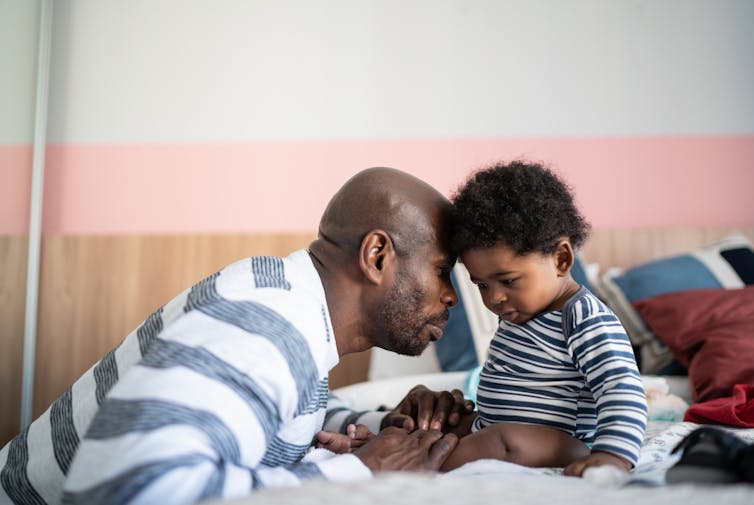
Julie Pernaudet, University of Chicago; Dana Suskind, University of Chicago, and John List, University of Chicago
The Research Brief is a short take about interesting academic work.
The big idea
The key to improving young children’s vocabulary and math skills may lie in changing their parents’ beliefs. We describe these findings in an article published in October 2021 in the peer-reviewed scientific journal Nature Communications.
When we measured parental beliefs about child development among 479 parents of newborns living in the Chicago area, a striking pattern emerged: Better educated parents were significantly more likely than parents with lower levels of education to believe that activities such as telling stories to their children, playing with them and spending time having conversations with them affect child development. We call such activities “parental investments”.
To understand how socioeconomic differences in these beliefs may drive inequality in children’s skills, we designed two interventions among low-income families in the Chicago area. Both intervention programs promote language-rich interactions between caregivers and children.
Our first intervention consisted of a series of short educational videos that provided tips and information about babies’ capabilities. Parents watched the videos when they visited their pediatrician for their child’s immunizations in the first six months after birth.
The second intervention was more intensive. Families with a child 24 to 30 months old received home visits by specifically trained members of our research team every other week for six months. During the 12 visits, the home visitors showed an educational video to the parents and then did an activity that demonstrated how to put the concepts covered in the video into practice. These demonstrations included, for example, how to use descriptive language with their child or incorporate math into everyday routines. Finally, the home visitors gave feedback and set goals for the next visit.
At the end of both experiments, parents were more likely to believe that parental investments affect child development than parents that did not get the interventions.
But we also found that parents in the more intensive program had significantly more interactions with their children than parents that did not get the intervention. The less intensive program had a similar but smaller effect on parent-child interactions.
Importantly, our results also indicate that the children whose parents received the home visits developed higher vocabulary and math skills – as well as improved socio-emotional health – immediately after the intervention and six months later, compared to those that did not get the interventions. As these are indicators of school readiness, it means that kids who got the treatment were better prepared for school. The first intervention, on the other hand, did not improve children’s vocabulary, which was the main outcome of interest for that program.
Why it matters
Research shows that socioeconomic inequalities in child development begin well before school starts. Investing in the early years of a child’s development can improve a variety of outcomes later in life, such as employment, earnings and physical health.
During the first years of life, parental investments are critical for the healthy development of children. Yet socioeconomic differences in parental investments, which have been consistently observed over time and across countries, exacerbate the educational and income inequalities that are often seen in modern economies.
What’s next
The fact that only our more intensive intervention succeeded in making kids better prepared for school suggests that simply providing families with more information on child development and parenting is insufficient.
Our future work will address how to personalize support for families. We are developing a computer-adaptive version of the survey we used to elicit parental beliefs. This will tailor to each parent’s specific knowledge and needs and help us identify the most appropriate programs for each family.
[Too busy to read another daily email? Get one of The Conversation’s curated weekly newsletters.]![]()
Julie Pernaudet, Research Associate in Economics, University of Chicago; Dana Suskind, Professor of Surgery and Pediatrics, University of Chicago, and John List, Professor of Economics, University of Chicago
This article is republished from The Conversation under a Creative Commons license. Read the original article.
The views and opinions expressed in the article are solely those of their authors, and do not necessarily reflect the opinions and beliefs of WomenInScience.com.